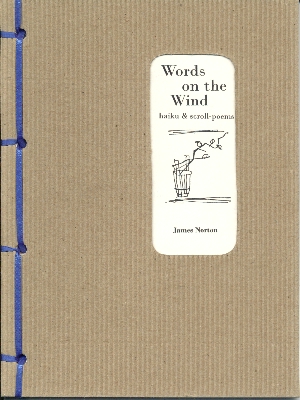
Extracts
Walking from shadow
his face a moment lit
this stranger
Who's more wide-eyed
them or us?
nest of wild kittens
Dinner over
in the bowl
one grain
Dare i tell him?
From my neighbour's dung-yard
a double rainbow
On a country road
an old man walks away
as night falls
This butterfly
has chosen a thistle-flower
to fall asleep on
Foreword
James Norton is a life-long seeker of truth who has stumbled across some of the deepest paths of Eastern tradition, of which haiku is one. The more familiar i grow with his works and the more i come to know the man, the firmer does my conviction become that there is a poet whose haiku art is at once an integral part of his quest and the outcome of such a quest.
The acrobatic act of dealing with life and art in this way cannot be achieved by dodging either of them. The difficulty is that one needs to be steeped in, and detached from, both at the same time. In Norton's language:
May heaven strike me if i weep
hell if i do not
For the Western mind, neither the dichotomy nor the harmony between life and art are in themselves difficult to understand. It is the "in-between the two", namely the real world we live in, that poses such intractable problems. The later poems in this colection suggest that a way forward has been found via the Eastern approach.
James Norton's experience of the wonders of the Eastern way must certainly be richer than that of the average man in the Orient. It includes Transcendental Meditation which brought him into contact with traditional Japanese arts with their Zen influence, such as kyudo (archery) and of course haiku.
This is his first collection. In it we are presented with a combination of haiku-orientated poetic inspiration, quest for truth via Eastern ways, Celtic sentiment and Irish literary values. He calls it an experiment. This is no mere self-effacement. i see it as a gateway to new form of international poetry, the possibility of new poetic values and a form of higher universality.
Norton's haiku have some of the most important features of their Japanese cousins.
For example, surprise or wonderment:
You walking ahead
the grass springing back
erases your steps
newness and traditional truths:
A vacant moment:
through double glazing
twin half moons
specific immediacy and universality:
Just echoeing boards
this empty house
where we laughed and cried
contrast:
Midsummer midnight:
a tiny shooting star
across mown fields
affection for small things:
Lengthening
the snail's shadow
draws out the sun
nature and human perception of her:
From bush to bush a wren is hurrying
between the blossom and the thorn
irony without being gimmicky:
Near home
the bell that never rings
bluegreen under starlight
Haiku in its ultimate sense is "the silence surrounding the utterance" as Norton points out, and it shares the silence with all the best forms of arts. The tea ceremony, archery and calligraphy are all done more or less in silence. Admiration is at its greatest if expressed in silence.
Susumu Takigochi, Oxford, 1997